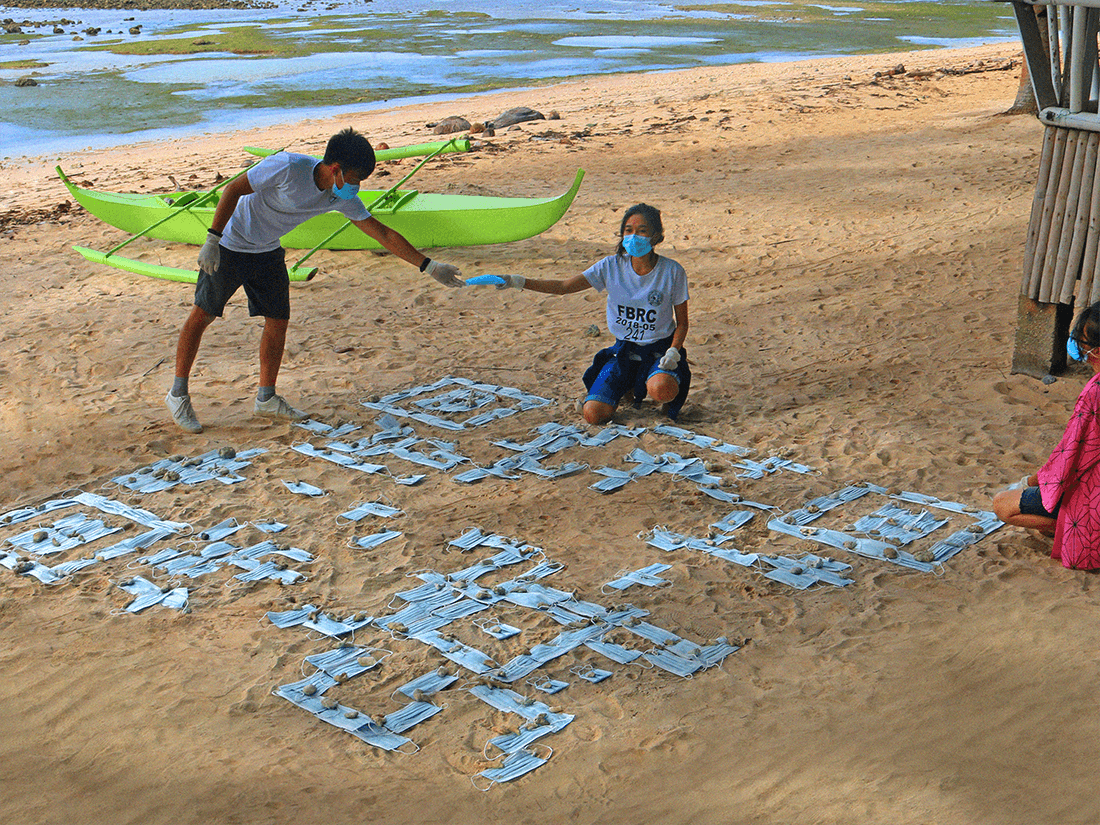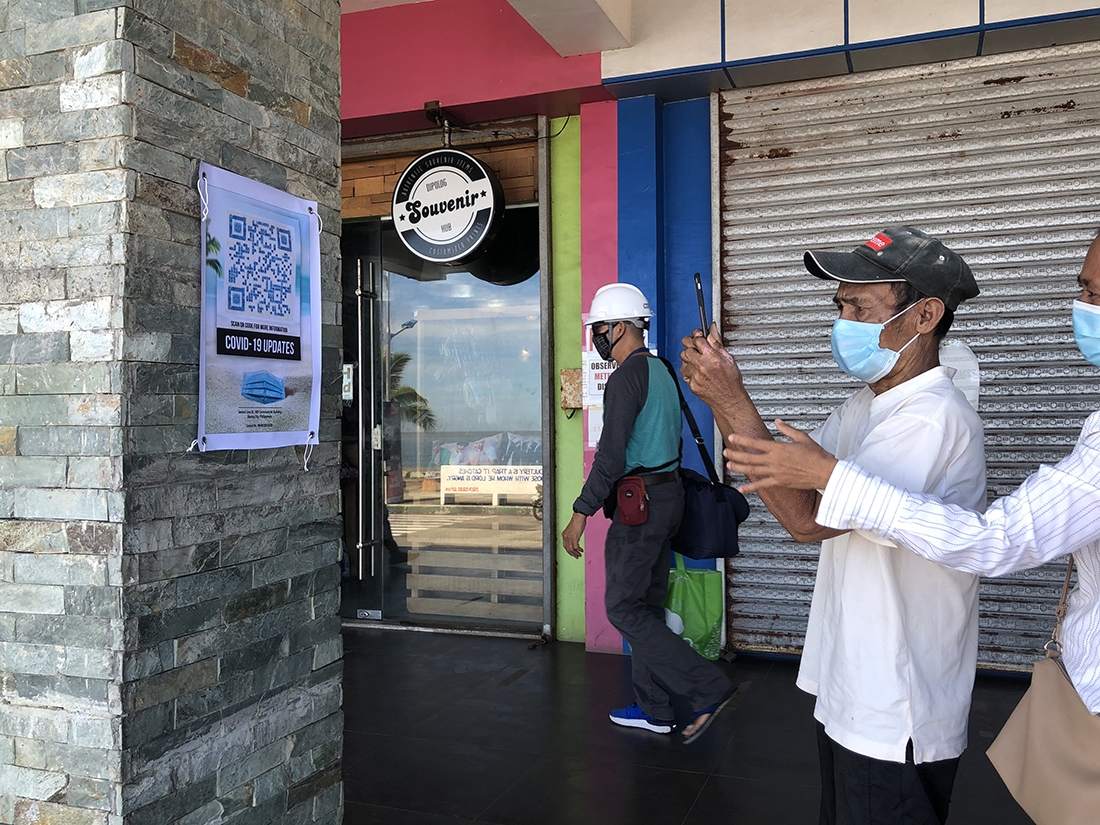SUMMARY
This is AI generated summarization, which may have errors. For context, always refer to the full article.

With more and more people discarding face masks and plastic gloves, 21-year-old Rizza Mae Hibaya knew she had to do something to stem a potential environmental crisis during the pandemic.
Starting with her local community in Dipolog City, Zamboanga del Norte, the Jose Rizal Memorial State University student and her friends launched a campaign to educate Filipinos about the environmental repercussions of improper mask and gloves disposal.
According to an article published in the ACS Publications’ Environmental Science & Technology journal, an estimated 129 billion face masks and 65 billion plastic gloves are used and disposed of each month since the pandemic began.
Hibaya shared that there are instances where people are burning face masks and personal protective equipment (PPE) after use, instead of properly disposing them. Burning of protective equipment can pose grave dangers to the environment since it can contribute to air pollution, among others.
Improper disposal has also brought face masks and plastic gloves to the seas, contaminating the water and endangering marine life.
“We don’t discourage people from using single-use face masks and gloves as they were recommended by the CDC (Centers for Disease Control and Prevention). But we advocate the proper disposal of face masks as they can contaminate our lands and seas,” Hibaya emphasized.
This pushed her and her friends to make a quick response (QR) code that will redirect users to the Department of Health website, where the official COVID-19 case count in the country is displayed, along with frequently asked questions about the virus and mask usage.
In order to make the campaign a reality, Hibaya teamed up with QRTiger, a QR code generator company, to build a giant QR code at a beach in Tag-Ulo, Dapitan City, using discarded face masks on July 1. These face masks were collected from Hibaya and her fellow students’ homes.
Hibaya and her team sprayed a disinfectant solution on each mask to kill the accumulated bacteria, and dried the masks under the sun for a whole day, before handling them.
Using technology to raise environmental awareness
In an interview with Rappler, Hibaya shared that she came up with the campaign by bridging the gap between two core ideas: technology and environmental awareness.
She knew that her campaign would have to be unconventional if she wanted to make a real impact during the pandemic.
“We wanted a new way of raising awareness through the use of technology such as QR codes. These are commonly used during the pandemic in line with the touchless form of interaction,” Hibaya said.
Hibaya recounted how locals approached them and asked questions when they first assembled the QR code on the beach. This gave them an opportunity to personally explain the environmental impact of COVID-19, and to provide demonstrations on how to properly wear and dispose of face masks.
According to the DOH, face masks must be discarded in a closed bin immediately after use to avoid potentially contaminating surfaces and clothes. The DOH also urged the public to segregate used surgical or medical face masks from general waste for proper disposal.
“While we are facing a health crisis, we want to inject the existing environmental issues which include littering of plastics and other non-biodegradable materials,” Hibaya said.
Once they finished assembling the giant QR code, the students took a photo of the code and used it for a poster, which they reproduced and disseminated to populated areas in Dipolog City.
Of course, the students made sure to collect the face masks they used and to dispose of them properly after they took a photo of the finished piece.
Impact on local community
Hibaya’s campaign didn’t end with the giant QR code on the beach.
When she and her team put up the posters around Dipolog City, they piqued the curiosity of locals who wanted to scan the QR code and learn more about their initiative.

Hibaya and her team even reached out to a pedicab driver to ask if they could hang their poster on his pedicab.
“He willingly agreed! When we told him we are hoping to remind people of proper use and disposal of face masks and gloves in this new ‘normal,’ he immediately asked how so he can educate his riders himself. He even asked how he can scan the QR code, so he can show it to his passengers,” she said.
Within days, Hibaya was able to see the impact of her campaign in her local community. On August 21, QRTiger was able to track 2,185 scans from Android devices and 1,674 scans from iOS devices – all of which were located in Dipolog City.
Though her campaign started out small, Hibaya hopes to branch out through social media to share their advocacy with Filipinos from all over the country.
In April, socioeconomic think tank Ibon Foundation highlighted how environmental concerns have hindered people from addressing the coronavirus crisis early.
“We will make the most use out of social media by creating educational videos, photos, and conducting webinars. We will [also] create our own website that would explain better the environment repercussions of improper mask disposal,” Hibaya said.
If all goes according to plan, Hibaya and her team would also like to take the next step in promoting environmental awareness by doing cleanup drives in local beaches and even in the mountains.
“We want to save our seas, land, and air because some people are really burning face masks and PPE just for the sake of minimizing the amount that goes to the landfills. We are very alarmed about that,” Hibaya shared. – Rappler.com
Add a comment
How does this make you feel?


![[Time Trowel] Evolution and the sneakiness of COVID](https://www.rappler.com/tachyon/2024/02/tl-evolution-covid.jpg?resize=257%2C257&crop=455px%2C0px%2C1080px%2C1080px)


There are no comments yet. Add your comment to start the conversation.